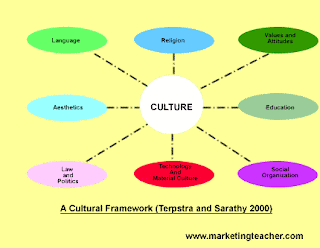Culture is based on a number of different factors and can help influence buyers in the decision making process. The key factors which culture is based on are family and society values/ attitudes, the way people perceive the difference between right and wrong, a group of memories and the way a community learns.
Definition in my words:
This is a quality which an individual person holds from their upbringing and environment. A culture can be defined as the way people behave and beliefs of a certain social, age or ethnic group. Culture is mainly formed from family attitudes, values and attitudes which are given by society, as well as family values and rules.
Main components of a culture:
· Values
· Beliefs
· Customs
Culture affects everything that we as people do. It is one of the main aspects which influence our decision making process. There are number of different theories into consumer buyer behaviour which incorporate culture into them.
Here is a culture framework which shows there are some key initial values which are considered and on the top of this list is culture:
Source: http://www.ishir.com/cmmi.htm (Accessed: 24/04/2011)
One theory which looks into culture is Terpstra and Sarathy (2000) Cultural Framework. This is a way in which marketers are able to asses how culture affects a specific market and takes into account a number of different aspects:
Source: Terpstra and Sarathy (2000) http://www.marketingteacher.com/lesson-store/lesson-international-marketing-culture.html (Accessed: 24/04/2011)
A communities culture greatly affects how likely they are to purchase a certain product. Religion also plays a major factor as marketers must ensure what they are marketing is suitable for a specific market group. An example is when marketing Christmas products, businesses are more likely to approach a country with a wider Christian population rather than one that has more of a Muslim population.
When marketing a product organisations must consider a culture and whether the product would be acceptable within the community. A lot of marketers have to rethink their marketing strategies as different cultures see things in different ways, for example western culture may accept a certain marketing message however in eastern cultures it may not be acceptable.
When marketing a product organisations must consider a culture and whether the product would be acceptable within the community. A lot of marketers have to rethink their marketing strategies as different cultures see things in different ways, for example western culture may accept a certain marketing message however in eastern cultures it may not be acceptable.
If marketers do not adapt their marketing strategies for different cultures it may lead to marketing and products to be banned which gives an overall negative image to the product and brand. This also can cause them to lose a large target market and cause a loss in revenues, therfore a lot of marketers are investing a lot of money and time into adapting their strategies.
Lecture:
During the lecture we were asked to look at different cultures and build a stereotype based on their culture. Some of the things we looked at included five famous people to come from a country, favourite food, religion, and national values.
We looked at the USA. The five most famous people which we came up with were Michael Jackson, Madonna, Tiger Woods, Muhammad Ali and Martin Luther King. The most famous food which was agreed was burgers and chips. The majority of the people from the country are Christian.
Although we were just generalising what we thought of a particular country this does not mean every individual is like this, however this is mainly what marketers use when marketing a specific product.
References:
- http://www.ishir.com/cmmi.htm (Accessed: 24/04/2011)
- http://www.marketingteacher.com/lesson-store/lesson-international-marketing-culture.html (Accessed: 24/04/2011)


Starts well with coverageof the theory but needs further discussion particularly regarding the marketing application
ReplyDelete